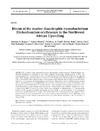Identificador persistente para citar o vincular este elemento:
https://accedacris.ulpgc.es/handle/10553/50282
| Título: | Bloom of the marine diazotrophic cyanobacterium Trichodesmium erythraeum in the Northwest African Upwelling | Autores/as: | Ramos, Antonio G. Martel, Antera Codd, Geoffrey A. Soler Onis,Emilio Coca, Josep Redondo, Alex Morrison, Louise F. Metcalf, James S. Ojeda, Alicia Suárez, Sonia Petit, Michel |
Clasificación UNESCO: | 250616 Teledetección (Geología) 241705 Biología marina |
Palabras clave: | Cyanobacteria Trichodesmium erythraeum Remote sensing NW African Upwelling Advective jet, et al. |
Fecha de publicación: | 2005 | Editor/a: | 0171-8630 | Publicación seriada: | Marine Ecology - Progress Series | Resumen: | A bloom of the non-heterocystous diazotrophic cyanobacterium Trichodesmium erythraeum Ehrenberg is reported in the Canary Islands Archipelago during August of 2004, the warmest period of a meteorological series recorded by the National Institute of Meteorology (Spain) since 1912. Samples showed massive occurrences of T. erythraeum (1000 filaments ml–1) in different sectors of northern and southern waters off the central Canary Islands. Water analyses also showed a relatively low presence of dinoflagellates and diatoms. Quasi-true colour satellite images of dust storms, elevated sea surface temperature (the warmest satellite-derived record), chlorophyll a and geostrophic current fields showed satellite-derived optical positives of Trichodesmium in an African upwelling advective, jet-drifting westward current off the south Canary Islands. Analyses for cyanotoxins using HPLC found microcystins, which was confirmed by immunoassay, at concentrations from 0.1 to 1.0 µg microcystin-LR equivalents (g–1 dry weight of bloom material). A T. erythraeum bloom such as that observed in August 2004 in the NW African Upwelling does not appear to have been recorded for the area previously. The bloom may have developed due to the exceptionally warm weather and/or to the massive dust storms from the Sahara Desert observed in the NE Atlantic in August 2004. | URI: | https://accedacris.ulpgc.es/handle/10553/50282 | ISSN: | 0171-8630 | DOI: | 10.3354/meps301303 | Fuente: | Marine Ecology Progress Series [ISSN 0171-8630], v. 301, p. 303-305 |
| Colección: | Artículos |
Citas SCOPUSTM
67
actualizado el 08-jun-2025
Citas de WEB OF SCIENCETM
Citations
64
actualizado el 08-jun-2025
Visitas
174
actualizado el 18-ene-2025
Descargas
134
actualizado el 18-ene-2025
Google ScholarTM
Verifica
Altmetric
Comparte
Exporta metadatos
Los elementos en ULPGC accedaCRIS están protegidos por derechos de autor con todos los derechos reservados, a menos que se indique lo contrario.
